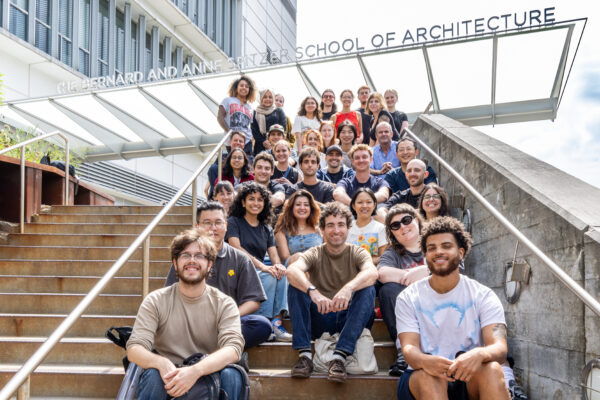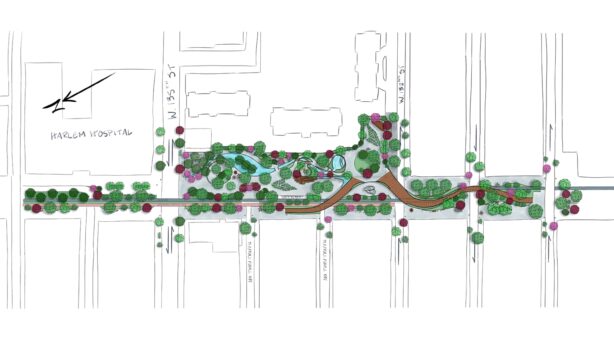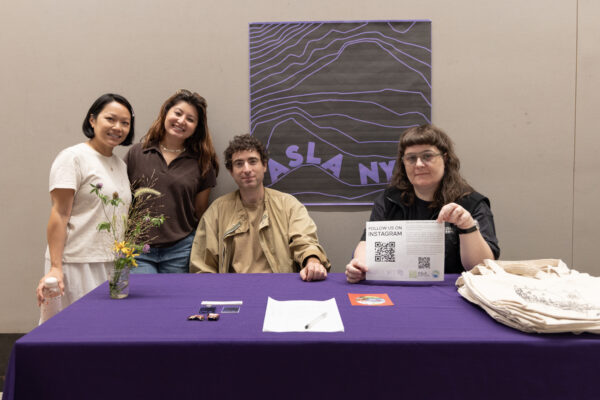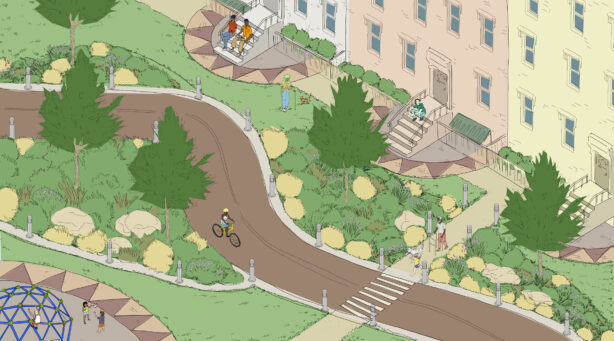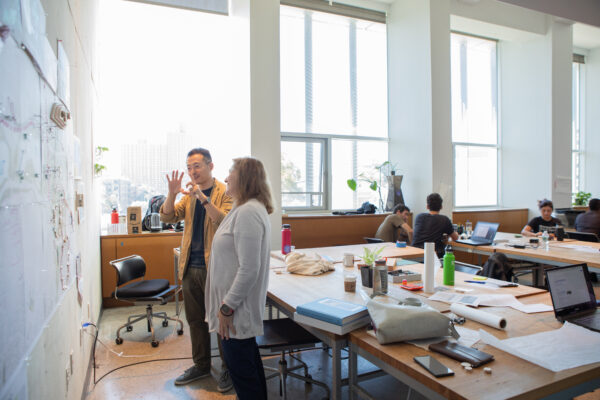Designing the Urban Ecological Future
Landscape architecture plays an essential role in connecting justice to environmental design and the ecological infrastructures of the urban realm. The mission of our MLA program is to prepare students to be leaders in the field of landscape architecture through innovative research and practice in urban ecological design, planning, and policymaking. The program aims to reimagine and rethink the profession’s current and future challenges through the lens of social, environmental, and multi-species justice, including rapid urbanization, resource extraction and management, the interface of nature and technology, ongoing species extinctions, and the climate emergency. The curriculum engages critical thinking about complex and indeterminate systems, empowering students to implement actionable change across multiple scales of the urban landscape.
In our design studios, we harness the dynamic environment of New York City as a living laboratory to experiment with innovative landscape and urban strategies. These studios incorporate diverse and multidisciplinary frameworks into landscape design and planning, drawing from fields like environmental sciences, engineering, and the humanities. Students cultivate landscape expertise by exploring a wide range of topics, such as urban agriculture, coastal engineering, urban ecology, and robotics.
Our students are prepared to be leaders in the field of landscape architecture through innovative research and practice in urban ecological design, planning, and policymaking. We are a small program with high-touch teaching, mentoring, and advising. Graduates of our program go on to work at design firms and public agencies.
Applicants from all undergraduate backgrounds are welcome in the Master of Landscape Architecture program.
HOW TO APPLY
ACCREDITATION
The Master of Landscape Architecture Program at the City College of New York’s Bernard & Anne Spitzer School of Architecture is fully accredited by the Landscape Architectural Accreditation Board. Click here for full accreditation details and other public information.
PREREQUISITES
The MLA program is open to students from all undergraduate backgrounds and has no formal prerequisites. Students will be expected to come in with an awareness of current versions of AutoCAD, Adobe Illustrator, Adobe InDesign, and Adobe Photoshop; basic spatial representation skills such as orthographic drawing and 2D drafting; and basic graphic design knowledge.
STEM DESIGNATION
Landscape Architecture is listed within the U.S. government’s official STEM fields list, meaning graduates with F-1 visas may be eligible for U.S. work authorization for up to three years. See the STEM OPT Hub for more information.
CURRICULUM
Total program credits: 90. Per-semester courseload: 15 credits.
First Year
Fall Term 1
LAAR 61100: Landscape Architecture Studio I
6 credits
The first design studio introduces a range of technical, spatial, and cognitive skills used in urban landscape design. Manipulation of terrain and spatial conditions are explored using two-dimensional traditional and digital drawings and three-dimensional physical models. Students learn analytic mapping techniques and investigate systemic site processes at multiple scales. Design research skills are interlaced with speculative environmental design strategies and spatial design propositions.
Corequisites: 61400 Digital and Traditional Representation, LAAR 61300 Landscape Technology I
LAAR 61400: Digital and Traditional Representation
3 credits
This course provides instruction in the fundamental skills and techniques of both analog and digital landscape architectural representation. Graphic design skills are instilled with instruction in photo-based image editing, illustration, and publication software. Additional instruction in vector-based AutoCAD and advanced three-dimensional rendering software such as Rhino supports both two-dimensional and three-dimensional digital drawing techniques.
Corequisites: LAAR 61100 Landscape Architecture Studio I, LAAR 61300 Landscape Technology I
LAAR 61500: Introduction to Ecology/Plant Identification
3 credits
This course provides an introduction to ecological theory and physical geography by using the environs of New York City as a living laboratory for the study and investigation of plant material and ecological systems. Students identify and observe local flora, seeking to understand relationships among ecological function, plant habitat, plant associations, soils, and hydrology in both natural systems and designed landscapes. The course includes field trips to public parks, botanical gardens, and arboreta.
LAAR 61300: Landscape Technology I
3 credits
This course presents the fundamental principles of site planning: the environmental and ecological factors of siting a building, grading, drainage, site structures, and material selection. Students use the analysis of small sites to evaluate underlying issues of environmentally responsible design, accessibility, zoning requirements, and affordability. Methods of site inventory, site analysis, and site selection are explored. Site grading — an environmental necessity, a functional requisite, and an aesthetic expression — is a key component of the course, and it is used to integrate pragmatic design decision-making into the design process.
Corequisites: LAAR 61400 Digital /Traditional Representation, LAAR 61100 Landscape Arch Studio I
Spring Term 2
LAAR 62100: Landscape Architecture Studio II
6 credits
The second design studio expands the range of landscape scales and deepens an understanding of urban context. Site analyses reveal narratives richly layered with diverse historical, social, and cultural significance for various groups. Site design is considered as a transformational practice leveraged at multiple scales. Dynamic environmental processes (soils, hydrology, geology, plant communities, and climate) as well as social and economic factors are deeply examined. The studio emphasizes digital presentation techniques and professional collaboration. Design proposals present strategic and transformative plans for implementation at the human, urban, and regional scales.
Prerequisite: 61100 Landscape Architecture Studio I
Corequisites: LAAR 62200 Intro to Landscape Arch History, LAAR 62300 Landscape Technology II
LAAR 62200: Introduction to Landscape Architecture History
3 credits
This course provides a cultural history of landscape architecture to understand the design, inhabitation, and ecologies of landscapes — including cities, gardens, territories, and the environment — across space and time, with an emphasis on infrastructure, power dynamics, and the urban realm. By critically probing landscape’s histories, narratives, and counter-narratives, students will be better poised to understand and articulate their own contributions to the field as future practitioners. The course follows a loose chronology based in synoptic themes, which will be presented with theoretical texts to provoke critical thinking about the development of landscape form and ideas among world cultures.
Corequisites: LAAR 62100 Landscape Arch Studio II, LAAR 62300 Landscape Technology II
LAAR 62700: Urban Ecology
3 credits
This course examines the ways that ecological systems function in the urban environment. The intertwined relationships between humans and so-called natural systems are explored, leading to an understanding of the effects of human activity on the biotic and abiotic components of urban systems. The course includes field trips to urban landscapes that are emblematic of the confluence of social, cultural, and environmental forces in the city. Geospatial analytic mapping is incorporated to spatialize the complex and dynamic systems present in urban ecologies.
Prerequisite: 61500 Introduction to Ecology/Plant Identification
LAAR 62300: Landscape Technology II
3 credits
This course is a continuation of the content described in the prerequisite LAAR 61300, with problems increasing in scale, complexity, and application constraints. In addition, the course provokes a deeper understanding of the relationship between urban development and constructed landform. Projects examine large areas and complex sites with multiple human and environmental overlays. Students address complex issues of site grading, drainage, site structures, and material. Site grading continues to be developed as a means of integrating design intent with the practical aspects of site planning and design.
Prerequisite: 61300 Landscape Technology I
Corequisites: LAAR 62100 Landscape Arch Studio II, LAAR 62200 Intro to Landscape Arch History
Second Year
Fall Term 3
LAAR 63100: Landscape Architecture Studio III
6 credits
This advanced studio laboratory addresses “wicked problems” in landscape architecture through extended design research and in-depth design propositions. Students analyze the cultural and ecological forces shaping a given urban landscape or condition, responding to topics such as social, environmental, and multispecies inequities; pollution and the climate crisis; and the opportunities and constraints of adaptation, mitigation, and remediation. Independent research methodologies are supported, and student work is expected to achieve the quality of a well-developed landscape design thesis and design proposition.
Prerequisite: 62100 Landscape Architecture Studio II
Corequisite: LAAR 64150 Design Research, LAAR 63300 Environmental Planning
LAAR 64150: Design Research
3 credits
This seminar complements the landscape architecture studio, developing essential methodologies of design research and advanced representational techniques. Students learn to conceptualize and communicate landscape analysis, design, and research techniques through the development of data-based infographics and maps; time-based videos and animations; and three-dimensional digital and physical terrain modeling. The Design Research seminar supports the development of students’ design studio theses and spatial propositions.
Corequisite: LAAR 63100 Studio III or LAAR 65100 Studio V
LAAR 63300: Environmental Planning
3 credits
Theoretical texts frame an examination of techniques for mapping the physical environment of the New York City metropolitan region, including geology, soils, surface water, plant communities, and climate change impacts. These serve as the basis for an examination of urban infrastructure systems, including circulation, energy, water, and waste. Large-scale planning initiatives in the New York area are examined from the perspective of complex social and environmental ecologies. Students prepare geospatial mapping analyses that explore past, current, and future urban conditions in the urban environment.
Prerequisite: LAAR 62700 Urban Ecology
Corequisites: LAAR 64150 Design Research, LAAR 63100 Landscape Arch Studio III
LAAR 65160: Urban Plants
3 credits
This course investigates plants as the quintessential material of urban landscape architecture. By building skills and knowledge drawn from the expertise of botanists, professional gardeners, and horticulturists, the course connects plant knowledge with the workings of the larger urban ecosystem, including urban design, policy, civic infrastructure, funding, phasing, and maintenance. Students will develop analytic drawings that explore the multifaceted ways in which plants and humans connect in the urban ecosystem.
Spring Term 4
LAAR 64100: Landscape Architecture Studio IV
6 credits
Continuing work from the previous semester, this advanced studio laboratory addresses “wicked problems” in landscape architecture through extended design research and in-depth design propositions. Students analyze the cultural and ecological forces shaping a given urban landscape or condition, responding to topics such as social, environmental, and multispecies inequities; pollution and the climate crisis; and the opportunities and constraints of adaptation, mitigation, and remediation. Independent research methodologies are supported, and student work is expected to achieve the quality of a well-developed landscape design thesis and design proposition.
Prerequisite: LAAR 63100 Studio III
Corequisite: LAAR 64400 Planting Design
LAAR 00000: History Elective
Elective offerings change each semester. For a sampling of recent electives, refer to the school schedule. In addition to landscape architecture electives, certain classes within architecture, urban design, and sustainability may fulfill elective requirements.
LAAR 64400: Planting Design
3 credits
Students explore the aesthetic potential of plant material to create compelling spaces, with attention to techniques for anticipating growth rates, projecting mature form, and predicting seasonal character changes. Environmental tolerances of plants in the designed landscape, particularly in constructed urban soil conditions, are an important focus of the course. Technical aspects of plant material selection, nursery practices, planting plan production, and plant specification are discussed, as well as the implications of plant selection on landscape management practices.
Prerequisite: LAAR 65160
Corequisite: LAAR 64100 Landscape Arch Studio IV
LAAR 00000: Urbanism Elective
Elective offerings change each semester. For a sampling of recent electives, refer to the school schedule. In addition to landscape architecture electives, certain classes within architecture, urban design, and sustainability may fulfill elective requirements.
Third Year
Fall Term 5
LAAR 65100: Landscape Architecture Studio V
6 credits
This advanced studio laboratory addresses “wicked problems” in landscape architecture through extended design research and in-depth design propositions. Students analyze the cultural and ecological forces shaping a given urban landscape or condition, responding to topics such as social, environmental, and multispecies inequities; pollution and the climate crisis; and the opportunities and constraints of adaptation, mitigation, and remediation. Independent research methodologies are supported, and student work is expected to achieve the quality of a well-developed landscape design thesis and design proposition.
Prerequisite: LAAR 64100
Corequisites: LAAR 64150, LAAR 64700 Landscape Restoration
LAAR 64150: Design Research
3 credits
This seminar complements the landscape architecture studio, developing essential methodologies of design research and advanced representational techniques. Students learn to conceptualize and communicate landscape analysis, design, and research techniques through the development of data-based infographics and maps; time-based videos and animations; and three-dimensional digital and physical terrain modeling. The Design Research seminar supports the development of students’ design studio theses and spatial propositions.
Corequisite: LAAR 63100 Studio III or LAAR 65100 Studio V
LAAR 64700: Landscape Restoration
3 credits
This advanced course examines histories and theories of restoration, the question of preservation versus conservation, and novel strategies for both mitigation and adaptation to address ecological health in the current climate crisis. The course focuses on the terrestrial and aquatic biomes of North America. Students will question and rethink conceptions of restoration as a return to a past condition, and they will attempt to constitute a theory of dynamic ecological health that embraces novel ecosystems and natural disturbance regimes.
Corequisites: LAAR 65100 Landscape Arch Studio V, LAAR 64150 Design Research
LAAR 65300: Professional Practice
3 credits
This course introduces the range of professional practice undertaken by qualified landscape architects at the site and planning scale in both the public and private sectors. The course familiarizes students with the range of legal and administrative requirements of practice and office projects. Topics explored include the pursuit of work, preparation of proposals, contracting of services, design and construction documentation, specifications, bidding, and construction administration. Final project hand-over to clients, project maintenance, and the ongoing management of liability are also discussed.
Prerequisite: LAAR 62300 Landscape Technology II
Spring Term 6
LAAR 66100: Landscape Architecture Studio VI
6 credits
Continuing work from the previous semester, this advanced studio laboratory addresses “wicked problems” in landscape architecture through extended design research and in-depth design propositions. Students analyze the cultural and ecological forces shaping a given urban landscape or condition, responding to topics such as social, environmental, and multispecies inequities; pollution and the climate crisis; and the opportunities and constraints of adaptation, mitigation, and remediation. Independent research methodologies are supported, and student work is expected to achieve the quality of a well-developed landscape design thesis and design proposition.
Prerequisite: LAAR 65100
LAAR 00000: History Elective
Elective offerings change each semester. For a sampling of recent electives, refer to the school schedule. In addition to landscape architecture electives, certain classes within architecture, urban design, and sustainability may fulfill elective requirements.
LAAR 00000: Professional Elective
Elective offerings change each semester. For a sampling of recent electives, refer to the school schedule. In addition to landscape architecture electives, certain classes within architecture, urban design, and sustainability may fulfill elective requirements.
LAAR 00000: General Elective
Elective offerings change each semester. For a sampling of recent electives, refer to the school schedule. In addition to landscape architecture electives, certain classes within architecture, urban design, and sustainability may fulfill elective requirements.


